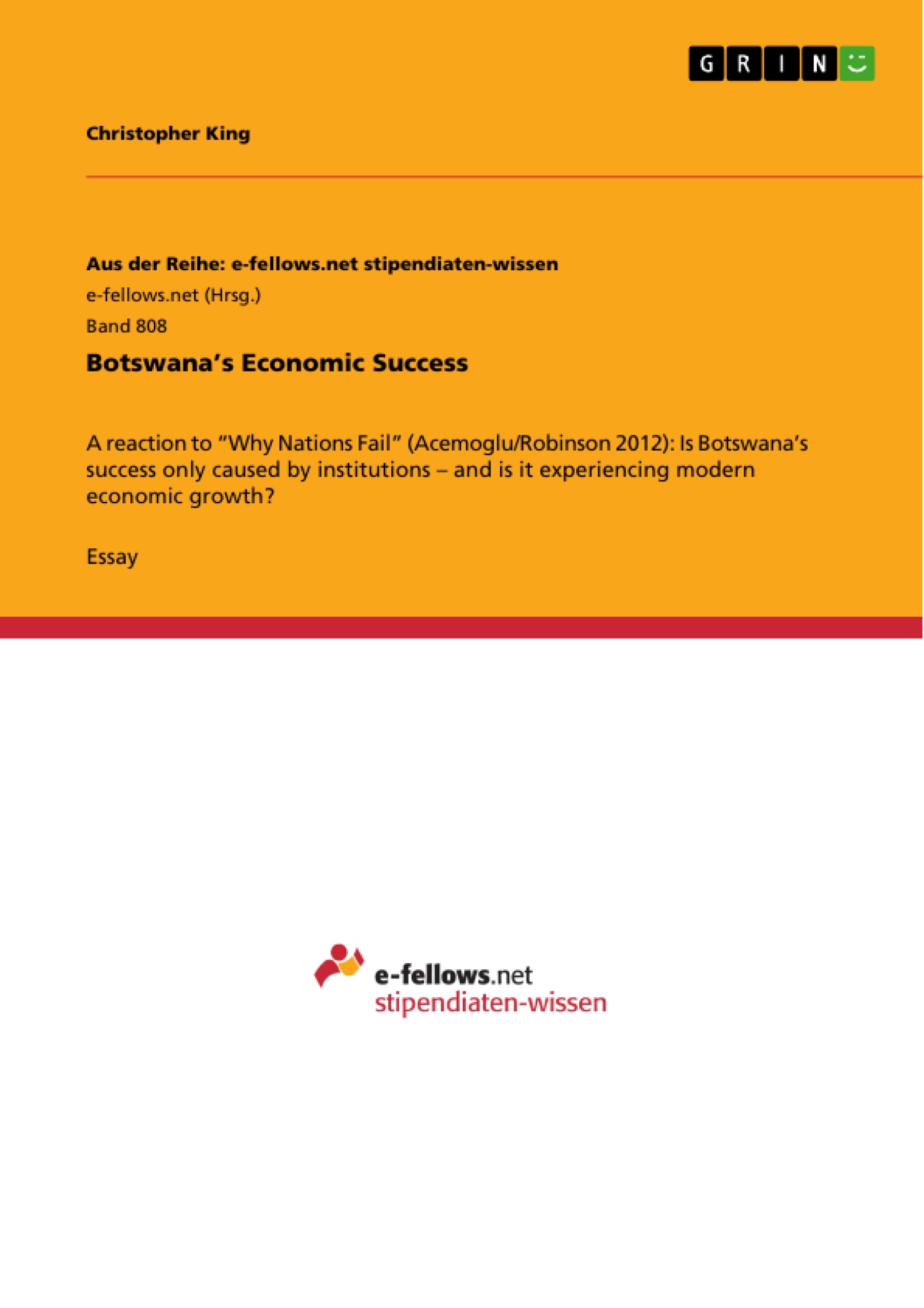Botswana is a landlocked country in southern Africa with a population of about 2 million people. It used to be one of the poorest countries in Africa, but after it gained independence from the United Kingdom in 1966, it went on a transformation to a middle-income country with a per capita GDP of $16,800 in 2012 (cf. Central Intelligence Agency 2013). Today, Botswana is a multi-ethnic and multi-party representative democracy with “inclusive institutions” and the least corrupt country in Sub-Saharan Africa (cf. Transparency International 2012). It is ranked by Freedom House as “Free” and has a very high HIV rate of 24.8%.
Botswana has been framed as an exceptional economic success story in Africa and the following essay will explore whether institutions are the only cause of Botswana’s economic success and if Botswana is experiencing modern economic growth.
Inhaltsverzeichnis (Table of Contents)
- Introduction
- Analysis
- Causes of Botswana's Success
- Is it Modern Economic Growth?
- Conclusion
Zielsetzung und Themenschwerpunkte (Objectives and Key Themes)
This essay examines the economic success of Botswana, a country that transitioned from one of the poorest in Africa to a middle-income nation. The main objective is to assess whether the success can be solely attributed to the presence of "inclusive institutions" as argued by Acemoglu and Robinson in their book "Why Nations Fail." The essay also investigates whether Botswana's growth represents "modern economic growth" characterized by industrialization and sustainable development.- The role of institutions in Botswana's economic success
- The impact of natural resources, particularly diamonds, on Botswana's development
- The extent to which Botswana has achieved "modern economic growth"
- The resource curse and its potential implications for Botswana's future
- The limitations of relying solely on resource-based economic growth
Zusammenfassung der Kapitel (Chapter Summaries)
Introduction
This chapter introduces Botswana as a country that has undergone significant economic transformation, evolving from a poor nation to a middle-income one. It establishes the context for the essay by highlighting Botswana's inclusive institutions, democratic governance, and high HIV prevalence. The introduction also sets the stage for examining whether institutions are the sole driver of Botswana's success and whether the country is experiencing "modern economic growth."Analysis
Causes of Botswana's Success
This section analyzes the factors contributing to Botswana's economic success, drawing upon Acemoglu and Robinson's thesis on inclusive institutions. It argues that while inclusive institutions played a role, other factors, including the discovery of diamonds and responsible management of natural resources, were crucial. The chapter examines the role of diamonds in driving economic growth, highlighting both the positive aspects, such as increased foreign direct investment and responsible diamond trade, and the potential for the resource curse. The section concludes by suggesting that while institutions mattered, they were not the sole determinant of Botswana's economic success.Is it Modern Economic Growth?
This section delves into the question of whether Botswana's economic growth constitutes "modern economic growth." It considers the definition of modern economic growth as a process of industrialization and sustainable development. The chapter argues that while Botswana has experienced significant growth, it has not yet achieved modern economic growth due to its reliance on raw diamond exports and lack of industrialization. The analysis points out the limitations of a resource-dependent economy, including the vulnerability to external factors such as commodity price fluctuations. The section concludes by suggesting that Botswana's economic success, while impressive, does not equate to sustainable development and raises concerns about its long-term prospects.Schlüsselwörter (Keywords)
This essay examines the economic success of Botswana, analyzing the role of inclusive institutions, natural resources, particularly diamonds, and the concept of "modern economic growth." It investigates the resource curse, the Dutch disease, and the limitations of resource-dependent development models. The essay also discusses the concept of industrialization, sustainable development, and the significance of Botswana's economic transformation in the context of African development.Frequently Asked Questions
Why is Botswana considered an economic success story?
Botswana transitioned from one of the poorest countries in Africa in 1966 to a middle-income country through democratic governance and resource management.
What are "inclusive institutions"?
As argued by Acemoglu and Robinson, these are multi-party democratic structures that allow for broad participation and are seen as a key driver of Botswana's growth.
What role did diamonds play in Botswana's development?
The discovery of diamonds provided essential funding and foreign investment, though it also poses risks of a "resource curse" or "Dutch disease."
Does Botswana experience "modern economic growth"?
The essay argues that despite high GDP, it is not yet "modern economic growth" because the economy lacks industrialization and relies heavily on raw resource exports.
What are the main social challenges in Botswana?
Despite its economic success, Botswana faces a very high HIV prevalence rate of approximately 24.8%.
- Quote paper
- Christopher King (Author), 2013, Botswana’s Economic Success, Munich, GRIN Verlag, https://www.grin.com/document/262782



